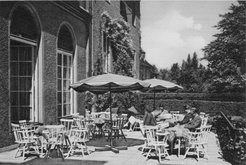Economics, Art & Politics
Harnack House was not just a meeting place for scientists but also an important venue for cultivating networks with politicians and industrialists as the club for Kaiser Wilhelm Society (KWG) members. The house’s guestbook impressively documents this networking activity with the state’s elites. As the topic has never been systematically researched, only a fragmentary insight can be provided into the role played by Harnack House as a meeting point for politicians and society.

The Presidents of the KWG regularly invited a group of select guests to attend banquets in the Mozart Room. In January 1933, Max Planck’s guests included Chancellor of the Reich Kurt von Schleicher, journalist Theodor Wolff, democratic member of the Reichstag Julius Moses and Max Planck’s son Erwin Planck who was Undersecretary of State at the Chancellery of the Reich. Eminent figures, including the industrialists Carl Friedrich von Siemens and Gustav Krupp von Bohlen und Halbach, sat on the Executive Committee and Senate of the KWG and also met at Harnack House for meetings of both bodies.
In Verwaltungsrat und Senat der KWG saßen namhafte Personen, die sich bei Sitzungen beider Gremien auch im Harnack-Haus trafen, darunter die Industriellen Carl Friedrich von Siemens und Gustav Krupp von Bohlen und Halbach.
Artists were also invited as guests as Harnack House sought to establish itself as a place of culture, of which science was a part. Wilhelm Furtwängler, chief conductor of the Berlin Philharmonic, sat on Harnack House’s Board in the early years, and illustrious actors like Gustaf Gründgens and Emil Jannings were invited to the KWG lecture series as speakers. The International Film Congress convened at Harnack House in 1935 for an event that was also attended by the famous actress Henny Porten.
After Hitler came to power, the KWG endeavoured to forge strong links with the leadership of the Third Reich. Propaganda Minister Joseph Goebbels and Adolf Hitler visited the building for an event to mark the opening of the Reich Film Archive. Armaments Minister Albert Speer met the Dahlem nuclear researchers in 1942 for a working meeting on the technical feasibility of making a nuclear bomb. Armaments advisors, such as Ferdinand Porsche, were also in attendance. Leading figures in the Third Reich regime also met in smaller groups at the invitation of the Duke of Saxe-Coburg, whom the KWG had appointed to its Senate in 1933 owing to his good contacts. He himself invited Adolf Hitler and Heinrich Himmler to Harnack House for dinners.
However, regular guests also included ambassadors dispatched to Berlin, above all those from the USA. US ambassador William Dodd frequently visited Harnack House, even during the Nazi regime.
